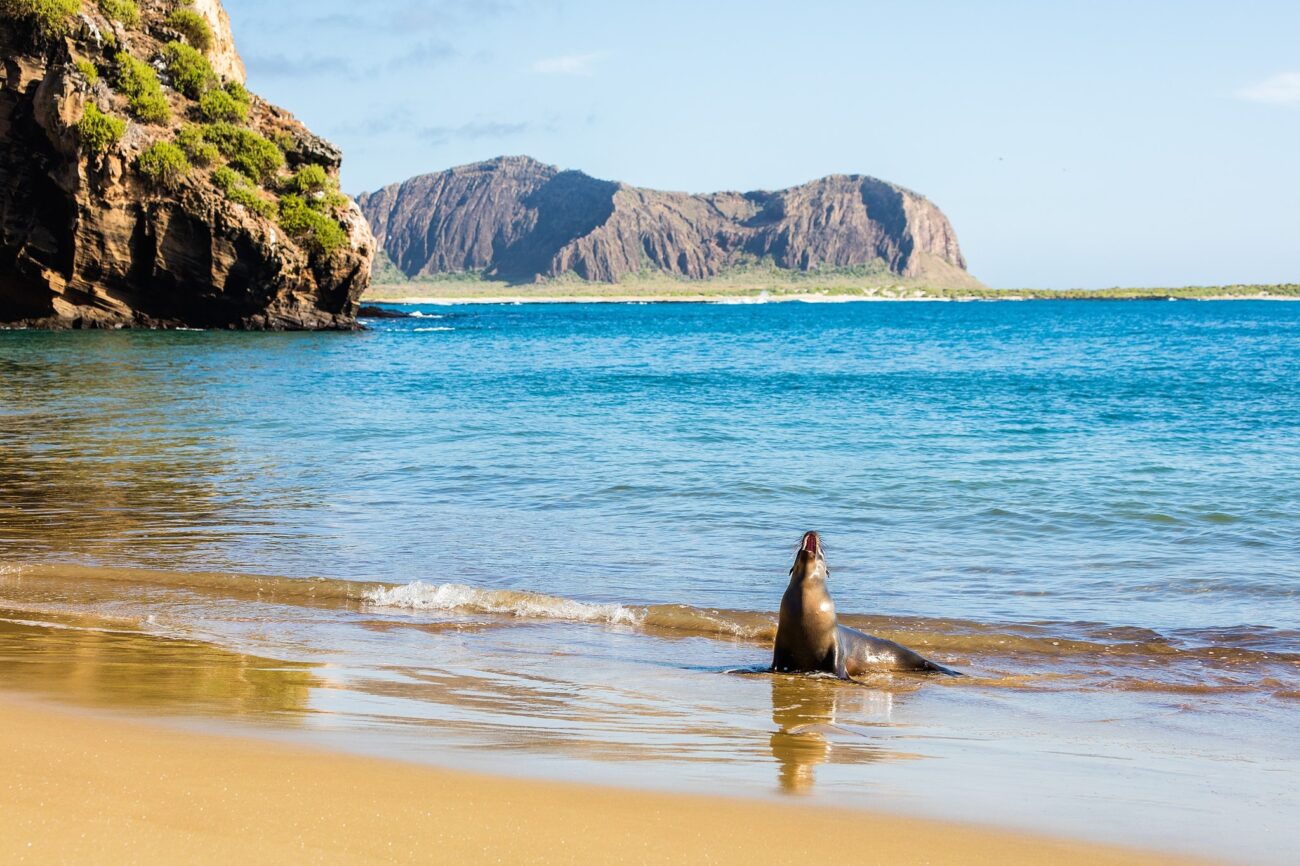Lorenzo Idrovo grew up on the easternmost island of the Galápagos Archipelago; a province of Ecuador 600 miles from the mainland. To Idrovo, it is utopia—perfect sunsets and walks along the promenade, and a chance to marvel at sea lions and dolphins jumping from crystal-clear waters, along with the occasional sea turtle and sometimes whales and orcas.
“You could literally say we live in paradise,” Idrovo said. But lately, he has been seeing something new: U.S. Navy warships.
On Sunday, November 16, Ecuadorians will vote whether or not to overturn the current constitution. If the referendum passes, it will likely dismantle the Rights of Nature, which is indirectly on the ballot, and also formally allow Ecuador to host foreign bases.
But it seems the U.S. might be getting a head start. “You can see the Navy ships, a bunch of people getting off, unloading military equipment, building a base, putting up satellites,” Idrovo said. “Soldiers getting drunk and wanting to catch [wild] animals.” He worries that if the constitution is rewritten, the situation will only get worse.
The constitution adopted in 2008 expressly banned foreign bases, but last year, after declaring a “state of internal conflict,” Ecuador’s president, Daniel Noboa, ratified military cooperation agreements enabling U.S. warships to patrol the area.
Noboa, a close ally to President Trump, is now seeking to grant the U.S. military more permanent footing in Ecuador, suggesting in a radio interview that a permanent U.S. military base would help the Islands cope with illegal fishing, fuel smuggling and drug trafficking. Noboa later walked back from the comments after social media backlash, saying the Galápagos was “out of the question” and not a priority right now, but not everyone is convinced he is being truthful.
Ecuadorians vote amid escalating tension
The approaching referendum is coming at the end of an Indigenous-led, near month-long strike concentrated in the northern highlands of mainland Ecuador. The protests began when Noboa removed fuel subsidies, increasing the price of diesel by over 50 percent.
According to human rights groups, at least two people have been killed and over 400 injured in the most recent protests. Last week, organizers called off the protest after Noboa threatened further military action against demonstrators.
“It’s genuinely uncertain whether that military base in the Galápagos would actually be built,” said Agustín Grijalva Jiménez, a former constitutional court judge. “We don’t know whether to believe him or not.”
Alberto Acosta, president of the Constituent Assembly from 2007 to 2008, is widely recognized as the architect of the current constitution. He said, “A U.S. military base is not useful for combating drug trafficking; that’s the pretext….the United States seeks to establish a base to strengthen its geostrategic position in this region amidst its imperial dispute with China.”
“Those who want to overturn the 2008 constitution are the oligarchies, who never agreed with the constitutional text,” Acosta added. “They are waging a fierce campaign against it, propping it up with a series of lies to confuse society…they want to bury the rights of Mother Earth, which represent one of the greatest achievements of the 2008 constitution.”
Attacks on the Rights of Nature and the Constitutional Court
Ecuadorians are familiar with popular referendums; the latest one was held just last year. But the upcoming referendum, if successful, will have lasting consequences and upend the jurisprudence established by the Constitutional Court.
Agustín Grijalva Jiménez, the Constitutional Court judge responsible for the landmark decision blocking the mining of the Los Cedros cloud forest, says a new constitution will call into question the “case law on both the Rights of Nature and the collective rights of Indigenous peoples.”
“The government and President Noboa have been explicit in saying this court must disappear, that it must be replaced by another institution subject to political judgment…signs they want to [grant more power to] a clearly authoritarian regime not subject to control by other public institutions,” Jiménez said. “Replacing the current constitution is inappropriate because it poses a clear risk to the rule of law and democracy.”
Ecuador was the first nation to constitutionally recognize the Rights of Nature in 2008, giving nature, or “Pachamama” (Mother Earth), a legal subjecthood “to exist, persist, maintain and regenerate.” Similar measures have been adopted by the governments of New Zealand, Panama and Bolivia, and have even been picked up by subnational governments and courts, such as those of Pennsylvania in the U.S. and Tamil Nadu in India.
“The potential removal or weakening of the Rights of Nature in Ecuador would represent an unwelcome regression in a country that has long been a global reference point for constitutional environmental protection,” said Maria Antonia Tigre, director of global climate litigation at the Sabin Center for Climate Change Law, which is part of the Columbia Climate School.
“If Ecuador retreats from these protections, it could signal a broader shift away from innovative legal approaches to safeguarding ecosystems at a moment when many jurisdictions are moving toward stronger, not weaker, environmental guarantees.”
Many Indigenous, environmental and human rights groups in Ecuador are alarmed about the consequences of a yes vote.
“There will no longer be prior consultation, nor will there be pre-legislative consultation. The environmental principles of pro-nature, pro-humanity, and intergenerational sustainability will be eliminated,” said Yaku Sacha Pérez, president of the Andean Coordination of Indigenous Organisations.
Pérez is proud of the efforts embodied in the 2008 constitution, particularly the Rights of Nature provision. But he is concerned about a new constitution championed by Noboa. “[It’s] a neoliberal government, insensitive to nature, Mother Earth, and water,” he said. “They are going to remove the rights that get in their way.”
Source link
Guest news.climate.columbia.edu


